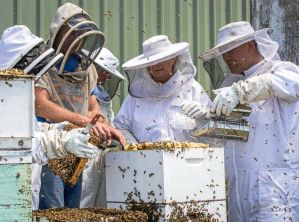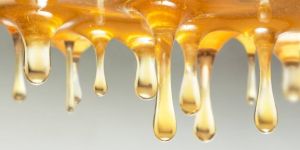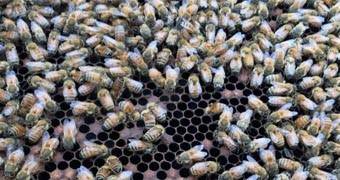A regional Australian company behind a game-changing bio insecticide that is safe for bees and other beneficial insects has secured funding to ensure its production remains on home soil. Innovate Ag from Wee Waa in northern New South Wales has spent 15 years developing Sero-X, a pesticide using peptides from the butterfly pea legume as its active ingredient. Last year the product was used under permit on macadamia crops and the Australian Pesticides and Veterinary Medicines Authority recently registered it for use by cotton growers. The company this week announced a partnership deal with the Belgium based Biological Products of Agriculture (Bi-PA) to help commercialise its invention and distribute it globally.
Bee deaths due to insecticide drift

The largest commercial honey bee pollinator in one of Australia's key food bowls claims he can no longer base his 2,000 hive operation in the region because of chemical use by the emerging cotton industry.
Bi-PA's chief executive officer Johan De Saegher said it would develop and register Sero-X outside of Australia and New Zealand but the product would be manufactured at Goondiwindi in Queensland.
Mr De Saegher said partnering with Sero-X would help Bi-PA address international markets' needs for safer agricultural products and would speed up development.
Sero-X could be transformative for beekeepers like Harold Saxvik, who claimed he could no longer base his 2,000 hive operation in NSW's Riverina because of chemical use by the emerging cotton industry.
In 2013, he lost 500 hives to insecticide spray drift which he believes came from nearby cotton farms.
Since then he has been moving his bees to avoid any risk but he said it had become unworkable.
Innovate Ag's project director Nick Watts said Sero-X had huge potential for improving the environmental sustainability and ethical production of food and fibre globally.
"The secret behind this innovative product comes straight from nature itself in the form of cyclotides," Mr Watts said.
"Cyclotides are peptides, or mini-proteins, that are naturally found in plants and have a range of biological activities, including insecticidal and antimicrobial."
They also have great pharmaceutical potential.
"Footy players have given peptides a bad name, but they are fantastic, potent natural compounds that can perform all sorts of functions," Mr Watts said.
Sero-X is already shaping up as a game changer in the macadamia industry which relies on honey bees for pollination but is susceptible to heavy losses from insect pests. Until now, growers could lose up to 50 per cent of their crop if they did not use broad spectrum synthetic pesticides, Macadamia Industry Board agronomist Neil Innes said. "There's more reliance on less specific, more broader spectrum synthetic pesticides which have a lot more affect on our pollinators," Mr Innes said.
"There's three basic pesticides and they all have major constraints and it's a big juggling act to not damage pollinators, moving hives around lots of growers have had issues with bee kills." Sero-X a 'no-brainer' for growers. Gympie based grower James Thomas was the first farmer to use Sero-X last year. "Well I can spray when I want exactly where I want and if the bees are still feeding during the day I can still spray when the optimum conditions are needed," Mr Thomas said.
"I don't have to wait one or two weeks until the bees are finished, I can just spray exactly when I need it to get the best use of the product and the bees will continue to feed and pollinate the flowers." He said the product had proven just as effective as chemical pesticide but was safe to use.
"I don't need to wear safety gloves because it's so benign to use, so it's an easy choice to make for us if we've got to use a spray when the bees are out feeding and pollinating, it's sort of a no-brainer," he said.
Research into the peptide based bio insecticide was started by the cotton industry 15 years ago, but Mr Watt and his agronomist father Kerry continued working on it when interest waned. In recent years, they have partnered with researchers from the University of Queensland's Institute for Molecular Bioscience.
The institute's group leader, Professor David Craik, and his research team studied natural cyclotides (mini-proteins) and engineered new cyclotides that could be used as insecticides or to treat human diseases. "We've been working with Innovate Ag to understand which cyclotides in the extract are active and how we can optimise the harvest of the plant so that the extract is more potent," Professor Craik said. Innovate Ag currently produces from a pilot plant in Goondiwindi and is aiming to commission a new production facility this year with an initial production capacity of 10,000 litres a week, with room to triple this as demand grows.
First posted





